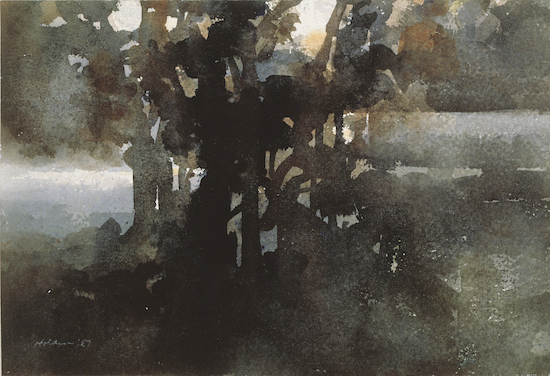World Watercolor Month: Donald Holden
World Watercolor Month began in 2016 as a way to honor the watercolor artists from all over the world. The art of Donald Holden is truly a fitting tribute to this artform, which in many ways can be very unforgiving.
World Watercolor Month July 2025: art by Donald Holden (1931–2017, United States)
Donald Holden was a master watercolorist who typically worked wet on wet.
 |
| Donald Holden, Swamp, 1987. Watercolor on paper, 18.4 x 27.2 cm. Courtesy of the Buffalo AKG Art Museum, Buffalo, New York. © 2025 Artist or Estate of Artist. (AK-1237) |
Holden established a spontaneous way of producing his landscapes, using a wet-on-wet technique in which the colors blend on the wet paper. He generally limited his palette to four colors, using only two fair-sized brushes. He revisited compositions over and over, often working on five paintings at once, with similar compositions but subtle changes in color or texture.
Holden's subjects are invariably places he had visited such as Lake Powell, the Maine coast, or nearby Hudson River Valley. He never painted outside, but from memory in the studio. He felt that painting from memory helps him eliminate non-essential elements. He often scrubs the painting surface to remove excess intensity of color or create the impression of light. The subtle tonal range and gradations of color happen organically, with the thick fiber of the heavy paper he uses helps create the fuzzy, dream-like atmosphere of his works.
Donald Holden was born in Los Angeles, and grew up in New York. He studied at the Art Students League in 1947. He received a BA from Columbia University and an MA from Ohio State University. He worked as an arts editor for Fortune magazine, and then an editorial director at a major New York publisher. Holden began his art career as an oil painter and sculptor. After becoming fascinated by watercolors, in 1986 we switched to only painting in watercolor on small scale landscapes. His works have been influenced by the Romantic British landscape tradition as seen in the works of J.M.W. Turner (1775–1851), J.A.M. Whistler (1834–1903) and Richard Bonington (1802–1828).

Comments